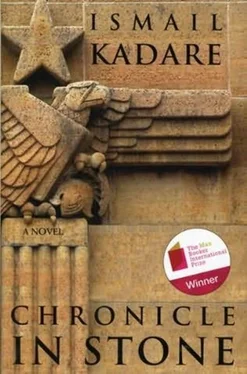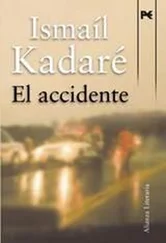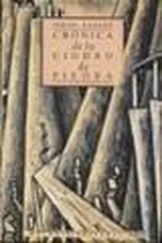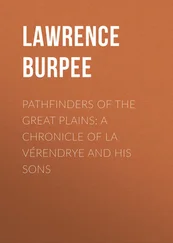Ismaíl Kadaré - Chronicle in Stone
Здесь есть возможность читать онлайн «Ismaíl Kadaré - Chronicle in Stone» весь текст электронной книги совершенно бесплатно (целиком полную версию без сокращений). В некоторых случаях можно слушать аудио, скачать через торрент в формате fb2 и присутствует краткое содержание. Жанр: Современная проза, на английском языке. Описание произведения, (предисловие) а так же отзывы посетителей доступны на портале библиотеки ЛибКат.
- Название:Chronicle in Stone
- Автор:
- Жанр:
- Год:неизвестен
- ISBN:нет данных
- Рейтинг книги:4 / 5. Голосов: 1
-
Избранное:Добавить в избранное
- Отзывы:
-
Ваша оценка:
- 80
- 1
- 2
- 3
- 4
- 5
Chronicle in Stone: краткое содержание, описание и аннотация
Предлагаем к чтению аннотацию, описание, краткое содержание или предисловие (зависит от того, что написал сам автор книги «Chronicle in Stone»). Если вы не нашли необходимую информацию о книге — напишите в комментариях, мы постараемся отыскать её.
Chronicle in Stone — читать онлайн бесплатно полную книгу (весь текст) целиком
Ниже представлен текст книги, разбитый по страницам. Система сохранения места последней прочитанной страницы, позволяет с удобством читать онлайн бесплатно книгу «Chronicle in Stone», без необходимости каждый раз заново искать на чём Вы остановились. Поставьте закладку, и сможете в любой момент перейти на страницу, на которой закончили чтение.
Интервал:
Закладка:
“Boo! Monster!” she said.
“I quite like my look.”
“Why do you want to look so ugly?”
“Because I feel like it.”
I began to move slowly, holding my neck stiff and my face screwed up, tightening every muscle to keep the lens from falling. She looked at me scornfully. For a moment I forgot my inexplicable irritation with her and, wanting to show off, I walked into the gypsies’ room with the lens over one eye, provoking the little cries of surprise and wonder that this trick usually aroused in them. On my way out I felt my cheek going numb. I couldn’t hold the lens in place any more, so I took it off and put it back in my pocket.
Suzana saw me take it off and came up to me and said softly, “Why are you always in a bad mood when you come over from your place?”
I looked at her and realised from her expression that she was closer to affection than to resentment. She took a step towards me.
“If you only knew! I’m so alone here. So bored.”
Her smile anticipated the kind words I would say, but just then, as if driven by some blind and irresistible force, suddenly and unthinkingly, I blurted out in a drawl that even I didn’t recognise as my own the words I had heard an Italian say:
“Che puttana!”
She clapped her hands to her mouth, took a step back, then another, then turned and ran away as fast as she could through the undergrowth. I stood there a moment, rooted to the ground. My forehead was covered with sweat. I was brought back to my senses by Grandma calling me for lunch.
I didn’t see Suzana again for the four days of my visit. Sometimes I thought I heard a rustle somewhere around me, but I couldn’t tell exactly where and I never did catch sight of her.
Autumn was closing in, the roses in the yard were fading, and everything was getting more barren by the day, but Grandfather’s old house had become brighter. These were the last evenings when the gypsies would play their violins. Grandfather, after reading his big books all afternoon, now smoked his pipe in the courtyard in the half-light, reclining on the divan. I would sit near him on a stool as usual, but I’d lost interest in tobacco and Turkish books, for Margarita often sat near me and put her arm around my shoulder. The sky was pitch black and now and then a falling star flashed in the void.
“A shooting star,” Margarita said softly. “Did you see it?”
I nodded.
To tell the truth, a star falling from the sky made about as much impression on me as a button falling off a coat, for Margarita’s thick hair was spread across my neck and her hair, her whole body, had a subtle fragrance I had never noticed on Mamma, Grandma or any of my aunts. Nor was it like any of the other smells I liked best, including the aroma of my favourite dishes.
It had grown cooler, and Grandpa got up from the chaise longue earlier now than on summer evenings. Everyone else got up after he did, the gypsies would put their violins back in their cases, and for a moment there would be silence. Then there would be a flash of lightning in the distance and Grandfather would say, “It’s going to rain tomorrow.”
“Good night,” the Gypsies would say on their way back to their shack.
“Good night,” Margarita’s husband would say, on the rare occasions he stayed there.
“Good night,” Margarita would reply in her warm voice.
“Good night,” they would all answer in turn.
I would say “Good night” too, last of all, sleepy as I was. Then the old steps would creak for a while until calm and sleep settled over everything.
Then the ceilings of the house came to life. The movements of mice, timid and sporadic at first, became bolder and more rapid until an unchained horde thundered from one corner of the attic to another. As the minutes passed, my mind turned the mice into the hordes of Genghis Khan, which I had seen in a film. Now they were gathering somewhere in the depths of Asia (Asia was Margarita’s ceiling). Getting ready for battle. A brief silence. Genghis Khan must be addressing his troops. He extends his hand toward the borders of Europe (the hall ceiling). The hordes move off. The commotion mounts, the ceilings groan. They cross the frontiers of our continent. The noise builds to a crescendo. Right above our heads. Terror. Carnage. Then the horde veers off. A messenger brings the news from the depths of Asia. A tribe has rebelled. The horde rushes back whence it came. Crosses the border again. Now they are back in Asia. A terrible slaughter begins. Margarita lies sleeping beneath the battlefield. Genghis Khan ought to end the hostilities. Doesn’t he realise Margarita is sleeping? But he’s not interested. In war there is no sleep, he shouts. And the battle rages on.
In the morning Grandma put her hand on my forehead.
“You talked in your sleep last night,” she said. “You don’t have a fever, do you?”
“No.”
It was my fourth and last day at Grandfather’s. After breakfast, I said good-bye and left.
On my way home, carrying a big piece of meat pie and Margarita’s name (the pie had been carefully wrapped in paper by Grandma; I’m not sure where I held Margarita’s name), I saw some school kids going up Varosh Street. They looked terribly upset. Their teacher Qani Kekezi must have dissected another cat in the classroom.
Nothing had changed at home or in the neighbourhood, but something was going on out on the plain across the river. The first thing I noticed was that the cattle that usually grazed there were gone. The haystacks were being taken away too. Trucks crisscrossed the plain. Eventually I began to see more clearly what was happening. A new, completely unknown word was cropping up here and there, made up of two other words: “air” and “drome” (we knew that “drome” meant “road” in Greek). Now everything was clear: across the river, in the plain at the foot of the city, an aerodrome was under construction.
Passers-by often stopped in the streets and alleys, turned towards the river, and gazed pensively into the distance.
A new guest had arrived. An unusual guest, lying flat at the city’s door, almost invisible. If it weren’t for the absence of the cows and haystacks, you might not have even noticed it was there. For my part, I was sorry the cows had gone. I missed the cows.
“Why is it called ‘aerodrome’?”
Javer looked at me thoughtfully with his grey eyes.
“Because it is the place where airplanes fly up into the sky.”
A guest. For better or for worse? It had crept in noiselessly. Thousands of astonished eyes observed it without fully realising that it was there. Now, stretched out over the whole length of the plain, incomprehensible and threatening, it perplexed everyone.
“War preparations.”
“Maybe. But it could also be to defend the city.”
“I don’t think so. It’s a sign that war is on the way.”
“Could be. All the same, a lot of people have got work there.”
“The money they earn is a loan from death.”
That was an exchange between two people I didn’t know.
There was more and more talk of the aerodrome. And it was only when they started calling it “aerodrome” that people realised that until then the plain had had no name. Apparently, it had had to wait for the planes to have its christening.
FIVE
When I got back from Babazoti’s, I sensed that the magic spells over our neighbourhood had lost almost all of their force. The workmen had also finished cleaning our cistern. Finally free of the powers of darkness, it was now being filled with fresh water, which gurgled joyfully along the eaves. I leaned over the mouth of the cistern and said, “A-oo.” Although filled with new and unknown water, it answered me at once. The same voice, just a little fainter. This meant that all the water in the world, whichever part of the sky it fell from, spoke the same language.
Читать дальшеИнтервал:
Закладка:
Похожие книги на «Chronicle in Stone»
Представляем Вашему вниманию похожие книги на «Chronicle in Stone» списком для выбора. Мы отобрали схожую по названию и смыслу литературу в надежде предоставить читателям больше вариантов отыскать новые, интересные, ещё непрочитанные произведения.
Обсуждение, отзывы о книге «Chronicle in Stone» и просто собственные мнения читателей. Оставьте ваши комментарии, напишите, что Вы думаете о произведении, его смысле или главных героях. Укажите что конкретно понравилось, а что нет, и почему Вы так считаете.












